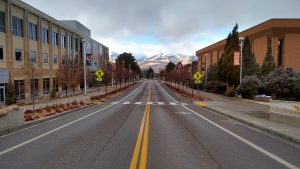In 2017 I made a significant professional and personal change of course. I was working as the Director of Industrial Control Systems at FireEye’s threat intelligence team. We had a great team, and had produced some compelling intelligence products.
But, I could see that critical infrastructure and industrial control systems was not on the list of important priorities for the company. I did not live in the San Jose or Washington, DC areas — which meant that my access to decision makers was only occasional.
I had been invited by Dr. Corey Schou, under whom I had studied previously, to teach one night a week in ISU’s newly created Cyber-Physical Security program. I was affiliate faculty. I viewed it as my chance to give back a little. It was a low-pressure situation. We only had three students signed up. It was probably best described as an experiment on both the University’s part and mine.

Through the process I recognized that I really enjoyed teaching. Students engaged with the subject matter. And when I walked through the hands-on educational laboratories in the ESTEC building, I realized there was a great opportunity to make something special — to build the next generation of industrial cybersecurity defenders — to create the program I wished I would have been a part of.
So, at the end of a year of teaching pro bono, I decided — let’s do this full time. It was a major change in many ways.
I found the ESTEC department amazing. Instructors have a mix of degrees — from AAS to MS. The requirement to teach was not academic credentials, but real world experience. These are the practical, “get it done people”, in contrast to the “let’s think about how we might go about his if we never had to actually do it” people (said somewhat tongue-in-cheek).
Perhaps most impressively, every one in my department was focused — entirely focused — on the students. These students would leave their various programs with a two-year degree making between 55 and 70 thousand dollars a year. Placement near 100%. It really is a neat place to be. And they have been very supportive of my vision and efforts.
We changed the program name to Industrial Cybersecurity Engineering Technology. We changed course names. We pushed a BAS pathway through the system so that students from a broad variety of Engineering Technology courses could have a clear pathway to bachelor degree that included layering cybersecurity on top of their previous hands-on experience. This last change has allowed students with Engineering Technology degrees in Instrumentation, Electrical, Mechanical, Nuclear Operations and On-site Diesel power to come through the program.
While we started with a heavy reliance on several adjunct faculty members (who had fantastic cybersecurity experience but no industrial cybersecurity experience), I worked my way through the course offerings, eventually authoring the following courses:
- ESET 0181 IT-OT Fundamentals
- CYBR 3383 Security Design for Cyber-Physical Systems
- CYBR 3384 Risk Management for Cyber-Physical Systems
- CYBR 4481 Critical Infrastructure Defense
- CYBR 4487 Professional Development & Certification
- CYBR 4489 Capstone
- ESET 4499 Current Intelligence Practicum
I have to admit that I have never worked harder. My previous efforts at entrepreneurship, as an expert analyst, and as a team manager were engaging and fulfilling, but do not compare with the breadth of competencies (beyond teaching) I have (attempted to?) developed as an instructor and program coordinator. For example:
- Helping administrators accurately understand the cybersecurity space
- Collaborating with peers from other departments on curriculum
- Recruiting students into the program
- Coordinating access to instructional space
- Ensuring students with disabilities have every opportunity to succeed
- Building and running an advisory committee of employers
In the end, it is very rewarding to see students become excited, work hard, and obtain great employment helping secure our critical infrastructure; but, it is no wonder that it is challenging to find, create, and retain good instructors in such an important, emerging field. I hope we are preparing the way!